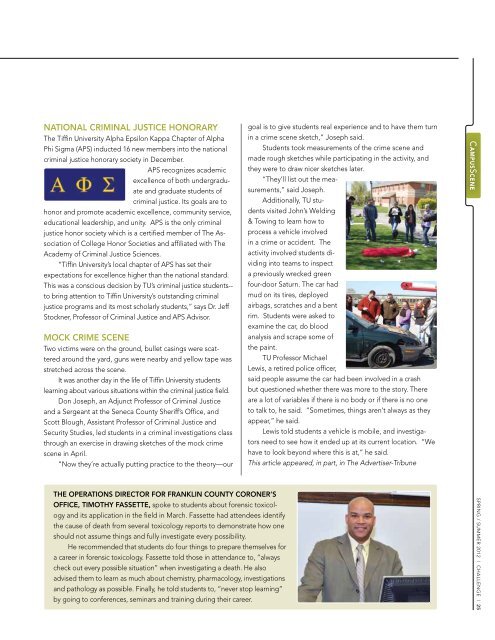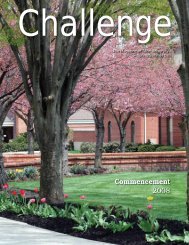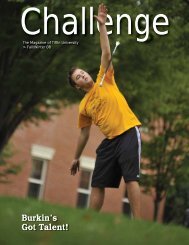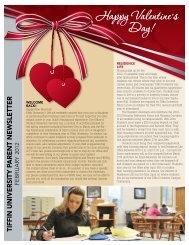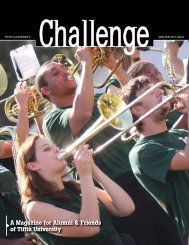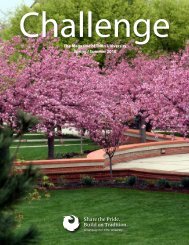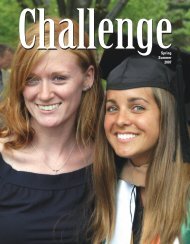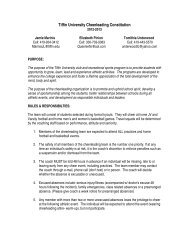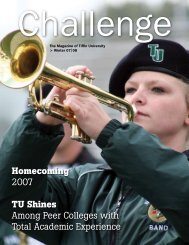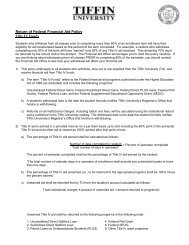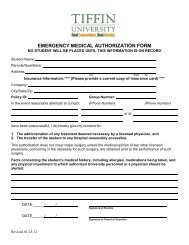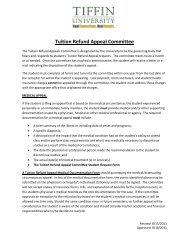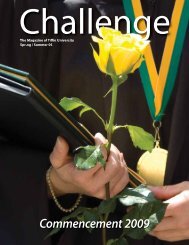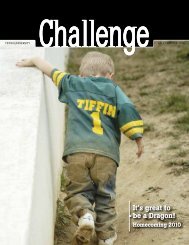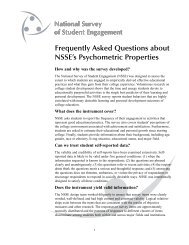Challenge - Spring/Summer 2012 - Tiffin University
Challenge - Spring/Summer 2012 - Tiffin University
Challenge - Spring/Summer 2012 - Tiffin University
Create successful ePaper yourself
Turn your PDF publications into a flip-book with our unique Google optimized e-Paper software.
National Criminal Justice Honorary<br />
The <strong>Tiffin</strong> <strong>University</strong> Alpha Epsilon Kappa Chapter of Alpha<br />
Phi Sigma (APS) inducted 16 new members into the national<br />
criminal justice honorary society in December.<br />
APS recognizes academic<br />
excellence of both undergraduate<br />
and graduate students of<br />
criminal justice. Its goals are to<br />
honor and promote academic excellence, community service,<br />
educational leadership, and unity. APS is the only criminal<br />
justice honor society which is a certified member of The Association<br />
of College Honor Societies and affiliated with The<br />
Academy of Criminal Justice Sciences.<br />
“<strong>Tiffin</strong> <strong>University</strong>’s local chapter of APS has set their<br />
expectations for excellence higher than the national standard.<br />
This was a conscious decision by TU’s criminal justice students--<br />
to bring attention to <strong>Tiffin</strong> <strong>University</strong>’s outstanding criminal<br />
justice programs and its most scholarly students,” says Dr. Jeff<br />
Stockner, Professor of Criminal Justice and APS Advisor.<br />
Mock Crime Scene<br />
Two victims were on the ground, bullet casings were scattered<br />
around the yard, guns were nearby and yellow tape was<br />
stretched across the scene.<br />
It was another day in the life of <strong>Tiffin</strong> <strong>University</strong> students<br />
learning about various situations within the criminal justice field.<br />
Don Joseph, an Adjunct Professor of Criminal Justice<br />
and a Sergeant at the Seneca County Sheriff’s Office, and<br />
Scott Blough, Assistant Professor of Criminal Justice and<br />
Security Studies, led students in a criminal investigations class<br />
through an exercise in drawing sketches of the mock crime<br />
scene in April.<br />
“Now they’re actually putting practice to the theory—our<br />
goal is to give students real experience and to have them turn<br />
in a crime scene sketch,” Joseph said.<br />
Students took measurements of the crime scene and<br />
made rough sketches while participating in the activity, and<br />
they were to draw nicer sketches later.<br />
“They’ll list out the measurements,”<br />
said Joseph.<br />
Additionally, TU students<br />
visited John’s Welding<br />
& Towing to learn how to<br />
process a vehicle involved<br />
in a crime or accident. The<br />
activity involved students dividing<br />
into teams to inspect<br />
a previously wrecked green<br />
four-door Saturn. The car had<br />
mud on its tires, deployed<br />
airbags, scratches and a bent<br />
rim. Students were asked to<br />
examine the car, do blood<br />
analysis and scrape some of<br />
the paint.<br />
TU Professor Michael<br />
Lewis, a retired police officer,<br />
said people assume the car had been involved in a crash<br />
but questioned whether there was more to the story. There<br />
are a lot of variables if there is no body or if there is no one<br />
to talk to, he said. “Sometimes, things aren’t always as they<br />
appear,” he said.<br />
Lewis told students a vehicle is mobile, and investigators<br />
need to see how it ended up at its current location. “We<br />
have to look beyond where this is at,” he said.<br />
This article appeared, in part, in The Advertiser-Tribune<br />
CampusScene<br />
The Operations Director for Franklin County Coroner’s<br />
Office, Timothy Fassette, spoke to students about forensic toxicology<br />
and its application in the field in March. Fassette had attendees identify<br />
the cause of death from several toxicology reports to demonstrate how one<br />
should not assume things and fully investigate every possibility.<br />
He recommended that students do four things to prepare themselves for<br />
a career in forensic toxicology. Fassette told those in attendance to, “always<br />
check out every possible situation” when investigating a death. He also<br />
advised them to learn as much about chemistry, pharmacology, investigations<br />
and pathology as possible. Finally, he told students to, “never stop learning”<br />
by going to conferences, seminars and training during their career.<br />
SPRING / SUMMER <strong>2012</strong> | CHALLENGE | 25


